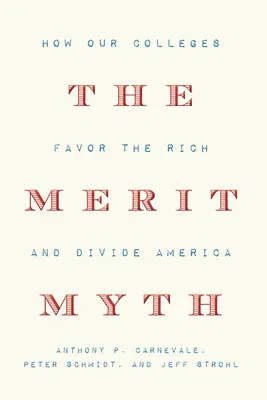An eye-opening and timely look at how colleges drive the very
inequalities they are meant to remedy, complete with a call--and a
vision--for change
Colleges fiercely defend America's deeply stratified higher education
system, arguing that the most exclusive schools reward the brightest
kids who have worked hard to get there. But it doesn't actually work
this way. As the recent college-admissions bribery scandal demonstrates,
social inequalities and colleges' pursuit of wealth and prestige stack
the deck in favor of the children of privilege. For education scholar
and critic Anthony P. Carnevale, it's clear that colleges are not the
places of aspiration and equal opportunity they claim to be.
The Merit Myth calls out our elite colleges for what they are:
institutions that pay lip service to social mobility and meritocracy,
while offering little of either. Through policies that exacerbate
inequality, including generously funding so-called merit-based aid for
already-wealthy students rather than expanding opportunity for those who
need it most, U.S. universities--the presumed pathway to a better
financial future--are woefully complicit in reproducing the racial and
class privilege across generations that they pretend to abhor.
This timely and incisive book argues for unrigging the game by
dramatically reducing the weight of the SAT/ACT; measuring colleges by
their outcomes, not their inputs; designing affirmative action plans
that take into consideration both race and class; and making 14 the new
12--guaranteeing every American a public K-14 education. The Merit
Myth shows the way for higher education to become the beacon of
opportunity it was intended to be.

